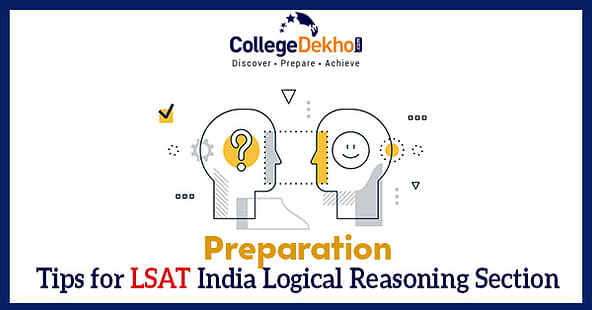With the right tricks and strategies, anyone can ace the LSAT India 2024 exam. Check out the tips, best books and important topics one must know in order to prepare for the LSAT India Logical Reasoning section.

For any student aspiring to pursue a legal education, the Law School Admission Test (LSAT India) stands out as one of the premier choices among law entrance exams. Conducted annually by LSAC Global, LSAT India serves as the gateway for admissions to undergraduate and postgraduate law programs in India.
Tailored specifically for application in Indian law colleges, LSAT India assesses advanced reading, informal reasoning, and deductive reasoning skills. The development of these crucial thinking abilities is pivotal for success both in law school and the actual practice of law. LSAT India is set to be held twice, on January 20-21, 2024, and May 16-19, 2024, conducted online in a computer-based mode.
Mastering the Logical Reasoning section of LSAT India is achievable with the right strategy and study materials. A thorough understanding of the comprehensive syllabus and exam pattern is crucial.
With its substantial weightage of 48.91%, it's evident that Logical Reasoning carries the utmost significance in the LSAT India. This section consists of two parts, Logical Reasoning 1 and Logical Reasoning 2, comprising 22 and 23 questions, respectively, contributing to a total of 45 out of the 92 questions. Given this substantial representation, excelling in Logical Reasoning is of paramount importance.
If you're seeking guidance on how to navigate the Logical Reasoning segment of LSAT India, you've come to the right resource. We've provided essential tips and techniques to help you conquer the exam. Additionally, we'll delve into important topics and recommend resources that can enhance your performance in LSAT India.
LSAT India Logical Reasoning Highlights 2024
Captured below are the highlights associated with the logical reasoning section of LSAT India 2024.
Section Name | Logical Reasoning 1 |
|---|---|
Total Questions | 22 Questions |
Sectional Duration | 35 Minutes |
Section Name | Logical Reasoning 2 |
Total Questions | 23 Questions |
Sectional Duration | 35 Minutes |
Negative Marking | No |
Type of Questions | Objective-type Questions |
Language | English |
Exam Mode | Online Mode |
LSAT India 2024 Detailed Syllabus for Logical Reasoning
In this section, questions will be asked to assess candidates' capability to analyze, critically evaluate, and complete arguments through the questions asked. The LSAT India Logical Reasoning 2024 section consists of 2 parts. The questions asked are not tough but candidates are critically evaluated and can analyze. Major topics are Venn Diagram, Clock, Calendar, Cubes, Blood Relations, Seating Arrangements, Syllogism, Logical Matching, etc. Every candidate should go through each logical reasoning question, read and understand the short passage, and then answer the questions. Solving these requires a certain amount of skills such as:
- Using principles or rules
- Providing well-supported judgments
- Deciding how additional evidence affects an argument
- Reasoning by analogy
- Recognizing argument flaws
LSAT India Logical Reasoning Important Topics 2024
Enlisted below are a few important topics for the LSAT India 2024 logical reasoning section.
Clocks | Seating Arrangement |
|---|---|
Venn Diagrams | Number and Letter Series |
Cubes | Binary Logic |
Logical Connectives & Logical Matching | Calendars |
Logical Sequence | Syllogism |
Blood Relations | Logical Matching |
Also Read:LSAT India Vs LSAT Abroad - What is the difference between them?
Top 5 Books for LSAT India 2024 Logical Reasoning Section
The best 5 books that can help in acing the logical reasoning section of LSAT India 2024 are as follows:
A Modern Approach to Logical Reasoning by RS Aggarwal
Objective Logical Reasoning by Vikas Experts
Universal's Logical Reasoning for CLAT, LSAT, and Other Law Entrance Exams by Jain Prateek (Author)
501 Challenging Logical Reasoning Practice Book by Learning Express
LSAT Logical Reasoning Bible Workbook (Powerscore Test Preparation) by David M. Killoran
LSAT India 2024 Logical Reasoning Preparation Tips
To prepare effectively for the Logical Reasoning section of LSAT India, follow these tips:
1. Familiarize Yourself with the Syllabus: Understand the logical reasoning syllabus thoroughly to identify essential topics. Gather reliable study materials and understand the exam pattern before starting your preparation.
2. Create a Structured Plan: Develop a feasible and well-structured study plan. Allocate specific topics to each day based on the remaining days until the exam. Tailor the plan to your strengths and weaknesses.
3. Master the Basics: Before attempting logical reasoning questions, ensure you have a solid grasp of the fundamentals. Gain a clear understanding of topics like Clocks, Seating Arrangement, Sequence, Calendar, and Blood Relations.
4. Practice Active Reading: Rather than skimming, read questions carefully. Many questions aim to confuse, so break down complex sentences and ask yourself relevant questions. This approach will guide you to the correct answers.
5. Emphasize Revision: Allocate time for revisiting crucial topics in the final month before the LSAT India exam. Revision helps reinforce your memory and boosts your overall preparedness.
6. Maintain Consistency: Regular practice is crucial for success in the Logical Reasoning section. Consistency aids in identifying and correcting mistakes over time.
7. Solve Sample and Past Papers: Solve numerous samples and previous year's question papers. This practice aids in analyzing your readiness and understanding the question types that appear in the exam.
8. Rely on Facts, Avoid Assumptions: Read questions carefully and refrain from making assumptions. The necessary information is provided; sticking to facts is essential for reaching accurate conclusions.
9. Monitor Your Progress: Regularly gauge your performance using LSAT India sample papers. Identify weak and strong areas to allocate your time and efforts effectively.
10. Take Mock Tests: Mock tests are invaluable for evaluating your preparation level. They simulate exam conditions, build exam stamina, and familiarize you with question patterns.
By following these strategies, you'll be well-equipped to excel in the Logical Reasoning section of LSAT India 2024.
Also Read:Career Options after LLB through LSAT India
That was all about the LSAT India 2024 Logical Reasoning preparation. If you have any questions pertaining to the same, just write to us in the Q&A zone. You can also explore top law colleges in India for direct admission without LSAT India or admission through LSAT India scores. In case you require any assistance, just dial the toll-free student helpline number 1800-572-9877 or fill up the Common Application Form (CAF). Our admission experts will be glad to help you out!
Stay tuned to CollegeDekho for more updates on LSAT India!

















Similar Articles
CLAT 2025 Dress Code
CLAT FAQs 2025: Common Law Admission Test Frequently Asked Questions
List of Courses Offered Through CLAT 2025: Check Course-Wise Eligibility Criteria
CLAT Login 2025- Forgot Password, Username, Steps to Retrieve
CUET 2024 Legal Studies Syllabus (Released): Check Topics, Pattern, Download PDF
Private Law Colleges in India Accepting CLAT 2024